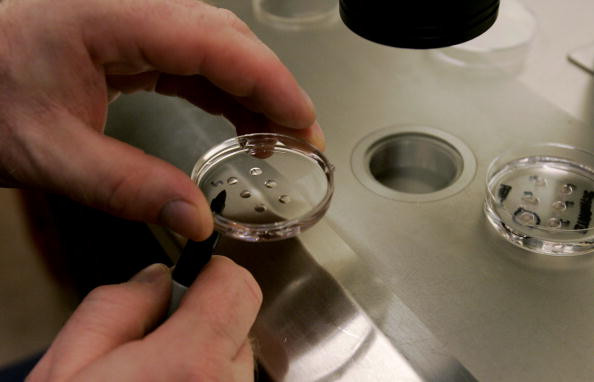Ethics furore over human embryo editing sees split among scientists

The scientific community is divided on the ethics of a controversial method of editing human embryos. A call for a moratorium from a large section has been opposed by some who see an opportunity in the technique to weed out deadly, inherited diseases.
Panic followed reports this week of a Chinese researcher Junjiu Huang at Sun Yat-sen University in Guangzhou using a gene-editing technique CRISPR/Cas9 on human embryos to modify the gene responsible for beta-thalassemia.
The unintended mutations that arose in the process were far higher than seen in previous gene-editing studies using mice or adult human cells.
The Alliance for Regenerative Medicine, representing more than 200 life-sciences companies, research institutions and advocacy groups, renewed its call for a halt to the research, according to an email sent to AFP.
"Given the significant safety and ethical implications of modifying the DNA of human reproductive (germline) cells, this research is highly premature," said the statement.
"We are calling for a voluntary worldwide moratorium on this kind of research to allow for rigorous transparent legal and policy discussions and continued public debate regarding the science, safety and ethics of modifying human embryos."
The editing tool CRISPR/Cas9 has been likened to a biological word-processor with a "find and replace" function. Scientists introduce enzymes that bind to a mutated gene associated with a disease, and then replace or repair it.
Moratorium call
The possibility of using such methods to genetically modify human embryos, and therefore humans and produce designer babies has raised the bogey of selective breeding in humans.
Edward Lanphier, chief executive officer of Sangamo BioSciences and chairman of the Alliance for Regenerative Medicine, has warned that the technique could be exploited for non-therapeutic modifications.
Lanphier wrote in a Nature commentary, "The human species is not a laboratory rat, it is not an improved corn plant—it's a unique species on this planet. The fundamental thing for me is this is a boundary that the human species should not cross."
The embryos obtained from a fertility clinic were technically damaged ones that could not have resulted in a live birth as they had an extra set of chromosomes after being fertilized by two sperm.
The team injected 86 embryos and 71 survived, of which 54 were genetically tested. This revealed that just 28 were successfully spliced, and that only a fraction of those contained the replacement genetic material.
Analysis also revealed a number of 'off-target' unintended mutations assumed to be caused by the technique acting in other areas of the genome.
"If you want to do it in normal embryos, you need to be close to 100 percent," Huang was quoted as saying. "That's why we stopped. We still think it's too immature."
Benefits of embryo research
Prof Robin Lovell Badge, Crick Institute, disagrees with a moratorium, "which is in any case unlikely to work well". Supporting research on discarded early human embryos in vitro [in culture/in the lab], he believes it could throw light on the role of specific genes in early human embryo development.
There is accumulating evidence that equivalent stages of embryos from other mammals, may rely on the activity of different genes, he says.
The Chinese experiment had a few issues with the design, Badge believes. The use of abnormally fertilised embryos could have activated DNA repair mechanisms leading to errors reported.
"Secondly, it would have made sense to test out the techniques and reagents (notably the "guide RNA") using human embryonic stem cells, which would be more similar to human embryos than the somatic cell line they used. They also chose a gene target that might itself be problematic, given that it is part of a closely linked family of globin genes with highly related sequences, making it hard to target one without affecting the others. "
Prof Shirley Hodgson, professor of Cancer Genetics, St George's University of London, however believes the research "is a significant departure from currently accepted research practice" as any manipulation of the germline of human embryos is potentially inheritable.
She notes that most gene therapy research that has been approved by regulatory bodies has been somatic, not germline, because of the potentially unpredictable and heritable effects of germline research.
Germline dangers
Altering the DNA of human sperm, eggs, or embryos could produce unknown effects on future generations, since the changes are passed on to offspring. This germline engineering differs from gene therapy that alters the DNA of non-reproductive cells to repair diseased genes.
The unintended mutations reported are a cause of concern over the technique, she adds. She warns that such research could spread from work on "non-viable" embryos, to work on viable ones once this type of research had been accepted in principle by international regulatory bodies.
Dr Dusko Ilic, reader in Stem Cell Science, King's College London Faculty of Life Sciences and Medicine, is all for the technique. "If and when one day genome editing in embryos becomes a successful and safe technology the couples who were so unlucky as to not have even a single healthy embryos will have an opportunity to have a healthy child."
As it stands today, standard preimplantation genetic diagnosis (PGD) technology can accurately determine several hundred inheritable diseases, and allows selection of embryos that do not carry the mutation.
Many European countries like Germany and Italy forbid experiments on human embryo but some like Spain and Sweden have liberal laws. The UK recently legalised a three-parent reproductive technique that replaces defective mitochondria, passed down from the mother, with the healthy mitochondria of a donor woman.
© Copyright IBTimes 2025. All rights reserved.





















